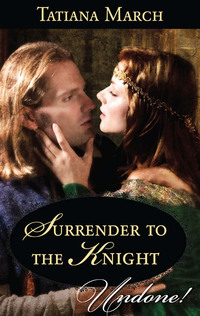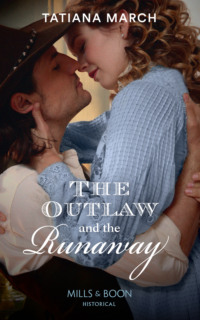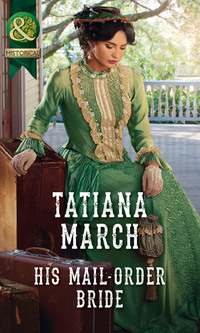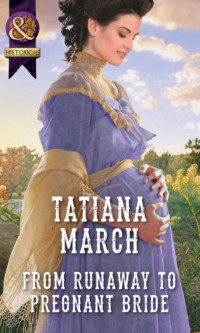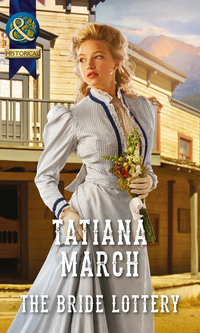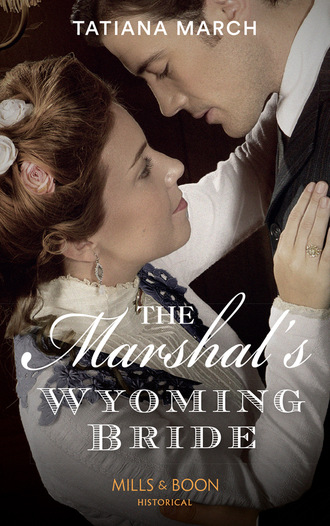
Полная версия
The Marshal's Wyoming Bride
Her thoughts drifted to the marshal who had come to interrogate her. Even now, in the privacy of her jail cell, Rowena could feel her pulse accelerating. She didn’t know what it was about him that disturbed her so. He wasn’t the most attractive man she’d met, but there was power about him, and determination and intelligence.
The marshal’s comments about a husband had stirred up unwelcome memories. Only two men had ever proposed to her. Freddy Livingston was rich and handsome, and she had imagined herself in love with him. He had courted her, believing her to be an heiress to a ranching empire, but the moment he had discovered the modest nature of her father’s holdings he had cast her aside. Had he broken her heart? No, Rowena decided. The shame of a public rejection had hurt more than the loss of Freddy as a future mate.
And the other proposal had hardly been a proposal at all. It had been Reese pointing at a young man in the crowd of men at her father’s graveside. “We’ll hold the ranch for you. It would make things easier if you married Luke here. My son, and as good a man as any.”
She’d barely caught a glimpse of this Luke Reese, a shadow among shadows in the twilight of a winter evening. She’d had some idea of a lithe man of medium height, with high cheekbones and jet-black hair. Part Shoshone, if she wasn’t mistaken, and the grief of growing up without a mother had caused her to speak up too sharply.
“How dare you talk to me about marriage?”
That night, she had walked off into the frozen darkness. Maybe one day she would find the courage to go back and claim Twin Springs, the ranch that was hers by law. However, she might have to fight for the property, and a woman could not win such a fight alone.
To claim Twin Springs, she needed help from a man, a fighting man. She would have to employ a man as unyielding and capable as the marshal with cold green eyes and a crescent-shaped scar on his face. The imprint of fangs was clear to see, as if some wild beast had taken a bite out of him and found him too tough to chew. What was it her father used to say?
“Make a deal with the devil and you might end up in hell.”
With a sigh, Rowena burrowed deeper into the blanket, trying to ward off the night chill. Of course, it was just an empty dream. She had no money to employ a gunman of any stature, not even the cheapest whiskey-soaked old-timer, and she was not brave enough to simply ride up to Twin Springs and claim ownership.
She directed her attention to the more pressing problems. What had happened to the two conmen who had rescued her from a snowdrift after she’d walked away from her father’s funeral? Eugene Richards and Claude Desmond—or Elroy Revery and Robert Smith, as they were calling themselves for this particular caper. Had they become stranded after their circus-trained horse, the faithful Scrooge, met his end at the bottom of the gully? Were they trying to make their escape on foot, lost in the desert?
Doubt and worry dulled her vision, dimming the stars visible between the iron bars. She had made her choices, but guilt ate away at her. Why did it have to be so hard to do the right thing? Why did it have to be so hard to know what was the right thing to do?
Claude and Eugene had found her nearly frozen to death, and had put their business activities on hold while they nursed her through the fever that followed. She’d known that they earned their living by dishonest means, but she had never seen it done. They had laughed about it, making it sound like an amusing escapade, a gambling game.
When she was well again, the pair had dropped her off at a stagecoach depot with enough money to last until she found a place to settle down. And now, two years later, fate had brought them to Pinares, and the cruelty and selfishness of their actions had become evident, leaving her with an impossible choice.
The people in Pinares were her friends. And by not exposing the scam she had failed to protect them. But what could she do? While she’d been close to death, Claude and Eugene had confided in her, shared their traumatic past. Claude, a slender man with delicate features, had been abused as a boy, hired out to men who gained pleasure from hurting children. And Eugene, a giant of a man, had been locked into a broom cupboard by his father, to stop the teenage boy from sneaking into the pantry and stealing food to nourish his growing body.
The history of incarceration in a closet barely big enough to accommodate the breadth of his shoulders had left Eugene terrified of enclosed spaces. And Claude would rather die than relive his childhood torment. Prison would be the end of them.
So, she had chosen to protect those two. But soon she’d have to tell the truth, even if no telegram arrived to let her know that Eugene and Claude had escaped to where the law couldn’t reach them. The pair of fraudsters might have once saved her life, but her loyalty didn’t extend as far as dying at the end of a rope to keep them out of prison. However, until the circuit judge arrived, she would have to remain silent, waiting for the right moment to reveal that she could not be guilty of murder, because there had been no murder at all.
* * *
The hotel room was quiet, the mattress firm, the sheets clean, but none of it improved Dale’s mood. He’d made a dog’s dinner of it. He’d barged into the jail, expecting to coax the facts out of the accused and be done with his assignment within a day.
Restless, he rolled over, the sheets tangling around him. He could always tell when a nightmare hovered at the gates of his mind. Sometimes he preferred to stay awake all night instead of letting the past horrors intrude. But tonight the long ride from the railroad took its toll. As Dale slipped into the shadowed world of slumber, Rowena McKenzie seemed to accompany him, her elegant beauty like a ghost of a life he had once expected to lead—the life of a gentleman, with a gentleman’s manners, a gentleman’s house, and a gentleman’s wife.
When the nightmare came, it was not the rancid breath of a coyote in his nostrils and the fangs tearing into his cheek. Neither was it bullets slamming into his flesh and the ground rising up to meet him as he tumbled down to the canyon floor. Those restless dreams were a legacy of the gunfight to break out of the lawless life.
This nightmare was from deeper into his past. He was twelve years old, the summer hot, Spanish moss hanging from the trees, the river low and sluggish as he and Laurel—already a young woman at sixteen—sat fishing on the bank. He could hear the sound of heavy boots crashing through the undergrowth. Coarse voices. Laurel’s whisper.
“Hide. Hide. Let me take care of them. Whatever happens, don’t come out. Promise me… Promise…promise.”
The images jumbled, flashed before his eyes. Soldiers holding Laurel down. One of them had his trousers pulled down all the way to his ankles. Bare buttocks rising and falling, rising and falling. Throughout the assault, Laurel made no sound at all but the soldiers joshed each other.
“Hey, Krieger, hurry up, it’s my turn.”
“Shut up, Ives, you idiot.”
Dale watched from his hiding place behind a tree, fraught with despair. He’d promised to Laurel not to come out. But the guilt, the sense of helplessness felt like a rock crushing his chest. Tears of shame stung his eyes. At twelve years old he regarded himself a man, and now he was behaving like a little boy, too frightened to intervene while the soldiers did those terrible things to his sister.
Craning forward so he could study the men waiting for their turn, Dale memorized the name of each man, and their features. Fisting his hands, he gave himself over to the hatred, his little boy’s mind striving for that grown-up feeling again.
When it was over, when all four men had sated their lust, they buttoned up their trousers and shared a smoke. Laurel lay on the ground, her dress torn, blood on her thighs, one arm slung across her face to keep her suffering private. But she was alive.
Not daring to move for the fear that the snap of a twig or the rustle of leaves might alert the men to his presence, Dale blinked away the tears of pity and shame and waited for the soldiers to be off on their way again.
“The little bitch, we have to do something.”
“No, leave her be.”
The one wearing a sergeant’s stripes dug out a few coins, tossed them down.
“Buy yourself a new dress, sweetheart.”
Heavy boots crashed past Dale’s hiding place. He counted the men passing. One. Two. Three. Only one more, and they’d be gone. He could go to Laurel. Help her. Comfort her.
A gunshot.
“Hey, Krieger, what did you do that for?”
“Couldn’t leave the little bitch telling tales.”
Dale woke up, the sheets soaked with perspiration, his body trembling, the nightmare still holding him in its grip. Two sets of patrician beauty, one merely a promise at sixteen, the other fully blossomed in her early twenties, merged in his mind. And it became clear to him that whatever the outcome of his investigation—whether Rowena McKenzie was guilty of murder or not—he could not let her die at the end of a rope.
Chapter Two
Tired and bleary-eyed, Dale ate breakfast in the hotel dining room. Sitting alone at a corner table, he fished a pencil stub from his pocket, tore a piece of paper from an old copy of the Arizona Weekly Citizen, and jotted down a list of questions:
1. Who was the man who caused a commotion when Revery was shot?
2. When did that man come into town and where was he now?
3. Had anyone seen Rowena McKenzie talking with Revery?
4. Who owned the wagon Revery crashed into the gully?
5. Who owned the wagon horse that ended the same way?
6. Had Rowena McKenzie lost any money in the swindle?
7. Who else had lost money and how much?
Not wasting any time, Dale tossed down his napkin, finished his coffee and set off to conduct his interviews. Outside, the street was quiet. Clouds had gathered in the sky again, and yesterday’s drizzle was turning into a few flakes of snow, the final gasp of winter. Good, Dale thought. The bad weather would keep people indoors and the storekeepers would have more time to talk.
He started with the barbershop. The small, dapper man with an oiled mustache gave him an assessing glance. “A haircut, sir?”
Dale nodded, took down his hat and settled in the reclining leather chair. Might as well use the time productively while he went about his business.
By early afternoon, he’d had his boots polished, his coat pressed, the fraying cartridge loops on his gun belt restored. He’d tasted three different kinds of angel cake, sipped whiskey and beer and tea and coffee. He’d listened to voices that ranged from shrilly female to the croak of an adolescent boy to the raspy cough of a man who smoked too much.
Everyone had good things to say about Rowena McKenzie. Pinares had been founded by Quakers, and although no one used thou or thee anymore, the abhorrence of violence that went with the religion was deeply ingrained in the community. In some other town, Rowena McKenzie might not even have been arrested for what she had done, but instead the citizens might have taken up a collection to reward her for so efficiently dispatching the conman who had taken advantage of their trust.
Dale’s best source of information was Alice Meek, the sturdy proprietor of the café where Rowena McKenzie worked. Needing little prompting, the woman talked in a breezy monologue while she chopped meat and vegetables for a stew, the only item on the lunch menu chalked to the blackboard by the entrance.
“The man that caused the commotion were a feller by the name of Robert Smith. New to town, he was. A small man, quiet and well spoken. A good customer at lunchtime. The first one to lay his money down for this mining claim. Kept telling everyone what a good investment it was. Went right off his head, poor soul. Don’t know what became of him. Rode off that very night. I reckon he took to hiding, too afraid to let his wife know he’d lost the money he was meant to use to bring his family out here. He were from Pennsylvania.”
“Did Miss Rowena get taken in by the swindlers, too?”
Carrot slices tumbled into the cauldron. “Miss Rowena? Invest? Poor lamb, she ain’t got a penny to spare. I’d like to pay her more but times are tough.” Mrs. Meek shook her head. “She’d been ill with a fever, Miss Rowena, but when she got to her feet again she went round warning people against parting with their money. Nobody listened to her, though, even though she has more book learning than any of them, of course excepting Mr. Carpenter—that’s the lawyer—and Reverend Poole.”
“Did you ever see her engage in private conversation with Revery?”
Mrs. Meek slammed the meat cleaver over a chunk of beef, mouth pursed, mental struggle evident on her rounded features. “Might as well tell you. Things usually come out anyway. Minna Tellerman—that’s the hotel owner’s wife—seen her come out of Revery’s room one night. Now, if it were any other woman, I’d think she been doing a bit of trade, if you take my meaning. But not Miss Rowena. She’s a lady, a real lady. Not a lady of the night.”
At his next stop, the livery stable, Dale discovered the wagon used in the escape had been rented but the horse, a big chestnut thoroughbred, had belonged to Revery, and he had ridden the animal into town. It was uncommon to have a horse trained for both harness and saddle, a detail which added to Dale’s suspicions.
A telegram to the Claims Recorder in the Warren Mining District received the surprising reply that the mining claim the swindlers had been peddling did in fact exist and had been legally filed, but the land had been sampled and was deemed worthless. However, the presence of the nearby Copper Queen mine in Bisbee, valued at nearly two million dollars, allowed even plain gravel to be marketed as if it were solid copper.
Dale returned to his room, compiled a list of the victims and the amounts they had lost. No one had been swindled out of more than one hundred dollars, a relatively modest amount in such an affluent town, and the majority of the victims had lost fifty or twenty-five dollars. It seemed the fraudsters were skilled in estimating what people could afford, and only allowed them to invest accordingly, using the excuse that they had a limited number of shares in the claim available and needed to give everyone an opportunity to profit.
When the list of investors was complete, Dale added up the total. Altogether, Revery and his accomplice, Robert Smith, had taken just over three thousand dollars.
Of course, Revery and Smith were unlikely to be their real names. Frowning, Dale searched his memory. He could recall reading about a similar case in Colorado a year earlier. On that occasion, the perpetrators had called themselves Edmond Rawlins and Billy Jones. One name with matching initials, the other so common it wouldn’t trigger any alarm bells. Everything tied together neatly. The only thing Dale couldn’t figure out was how Rowena McKenzie fitted into the setup. He got to his feet, glimpsed at his new haircut in the mirror and pulled on his freshly pressed coat. Time to find out.
* * *
It was not lonely in the jail. Women came to visit, delivering clean clothes and gossip. As long as the other two cells remained unoccupied, the nights were calm. The meals were adequate and the sheriff provided hot water to wash and the privacy to benefit from it.
If it hadn’t been for the worry about Claude and Eugene, and the guilt over having betrayed the people in Pinares that constantly chafed at her, like a pair of ill-fitting shoes, Rowena might have regarded her incarceration as a holiday. She harbored no fears about her own fate, for she took it for granted that the judge would believe her when the time came to reveal the truth. But today she felt restless. When her ears picked out a slightly uneven cadence of footsteps in the corridor, her heartbeat quickened.
She bounced up from the cot. Turning her back to hide her efforts, she fluffed up the wispy curls at her temples and adjusted the collar of her sage-green wool dress, a worn but good quality garment which Permelia Jenkins, the tailor’s daughter, had only just that morning returned after cleaning and pressing it with an expert touch.
Today the sheriff must have dispensed with his guardian duty, for the marshal with a crescent-shaped scar on his cheek walked up to the cell unaccompanied. A jolt went through Rowena at the sight of him. He’d had a haircut. And he’d tidied up his clothing. Although the difference was subtle, it emphasized the combination of violence and elegance that would surely have sent all her old school friends into a swoon.
The marshal unlocked the iron grille with one hand, while dangling a sturdy captain’s chair from the other. Not making a sound—not even a muffled clunk, as if to compensate for his angry outburst the day before—he lowered the chair to the floor, settled onto the wooden seat and fired a question at her.
“How do you know the men called Elroy Revery and Robert Smith?”
Rowena controlled a flinch. So, the marshal had already figured out the connection between her and the fraudsters. She sank to sit on the cot. “I have nothing to say.”
“What are their real names?”
“I have nothing to say.”
“Why did you help them escape?”
She clamped her lips together. I have nothing to say no longer seemed an adequate response, so she chose to meet a question with a question.
“How did you get your scar?”
“Do they have some kind of hold on you?”
“How did you become a federal marshal?”
That last question hit its mark. She could tell from the slight narrowing of those cool green eyes that watched her every move. “I have a deal for you,” Marshal Hunter said. “I shall answer one of your questions if you answer one of mine.”
Rowena mulled it over. In the back of her mind, she could hear her father’s voice, raspy from a lifetime of herding cattle in the harsh Wyoming climate. “Make a deal with the devil and you might end up in hell.” He’d quoted those words about using violence to defend the ranch, and the memory of his reluctance had made her doubt the word of Reese, the gunman who claimed her father had employed him.
But now, as Rowena met the sharp scrutiny of Marshal Hunter, an odd tingle of anticipation and daring skittered along her skin. Such a bargain could be used to provide misdirection, confuse the marshal’s train of thought. And, in truth, she wanted to learn more about him. What harm could there be, if she posed her questions wisely and gave her replies with caution.
“Can I choose which questions to answer?”
Marshal Hunter nodded his assent.
“How did you get your scar?”
“I was left for dead and a coyote tried to have me for his supper.” He paused and gave her a speculative look. “How did you end up in Pinares?”
Rowena suppressed a smile. So, he had accepted she wouldn’t talk about the shooting. He would lead her round and round the topic, attempting to trip her up. Sitting straighter on the cot, she curled her hands around the rough timber edge and sharpened her concentration. “I came here soon after I left school. How did you become a federal marshal?”
“I had nothing better to do. Where did you go to school?”
“Boston. Where did you grow up?”
“Louisiana. Are you running away from something?”
“I…” She was wearing thick socks and no shoes, and she lifted her heels, balancing the balls of her feet against the cold cement floor, the nervous movement hidden by the folds of her green wool skirt. “I was running away…when I came here…” Rowena lowered her lashes, but she could not resist glancing up again. She studied the crescent-shaped scar on the marshal’s face—a scar that bore the fang marks of a coyote. “And you…when you became a United States Marshal…were you running away from something?”
To her surprise, Marshal Hunter broke into a smile. It transformed his face, making him look young and carefree. The green eyes sparkled with humor. “I was running away from something,” he admitted. “And that something was an overbearing, determined mother who had her own ideas about how I should live.” The smile lingered. “My turn. Who were you running away from?”
She hesitated, then spoke quietly. “Myself.”
“Never an easy thing to do,” the marshal replied with a note of empathy in his tone.
Rowena nodded. “My turn.”
She intended to fire out another question, but her mind went blank. She had asked about his home, about his choice of career. What about his family? Before her brain caught up with the implications of the question, she blurted out, “Are you married?”
Slowly, the marshal’s expression sharpened and those green eyes fastened on her, so bold and direct Rowena believed they could see to the very core of her. But when the marshal replied, his voice was bland, perhaps a little impatient. “Why do you want to know?”
Up to now, she’d been enjoying the sparring. It had been like bantering with her suitors in Boston—not that she’d had many, for unlike some of her school friends she possessed neither great wealth nor important family connections—but what she felt now was not the girlish, superficial fluster of those occasions. What she felt now was deep and dark and laced with undertones of danger.
She inhaled a fortifying breath and refused to contemplate why the question about the marshal’s marital status might be of interest to her. “No particular reason,” she replied with a casual air. “I was just making conversation. And that was your question. My turn.”
She racked her brain, but her concentration was in tatters. She couldn’t think of anything that would allow an emotional retreat, could come up with no casual question that would draw them back from the dangerous waters of exchanging intimacies, of confessing hidden thoughts.
“Will you come back tomorrow?” she asked finally.
“Yes.” Like a gentleman who has been given a hint that his allotted visiting time had come to an end, the marshal rose to his feet. “Good night, Miss McKenzie.”
He retreated with those strangely deliberate footsteps she’d noticed before, not because of any visible quality in how he walked, but because her musician’s ear had picked out the distinctive cadence of his boot heels against the cement floor.
As the marshal turned around to slide the iron bars back in place, Rowena couldn’t stop herself from staring at him. One by one, she registered every part of his appearance—the coal-black hair, freshly cut, the gaunt face with high cheekbones, the green eyes framed with dark lashes, the hard slash of a mouth, the lean yet powerful body. Marshal Hunter stood still, aware of her scrutiny. For a while, it appeared to Rowena that time had stopped turning.
After what seemed like an eternity, the marshal dipped his head in a curt nod of farewell and vanished out of sight, leaving her alone with an avalanche of confused thoughts that ran the gamut from past failings into future possibilities.
* * *
Dale finished his morning shave and studied his reflection in the gilt-framed mirror hanging above the cracked porcelain washbasin in his hotel room. What had Rowena McKenzie seen when she’d stared at him with such intensity? Had she been repelled by his scar?
Are you married? Are you married? Are you married?
The question seemed to whisper at him from every corner of the shabby, well-worn hotel room. Dale shook his head, as if to dislodge the soft feminine voice that appeared to be stuck inside his mind. The attempt proved as futile as swatting at a fly with a piece of string.


